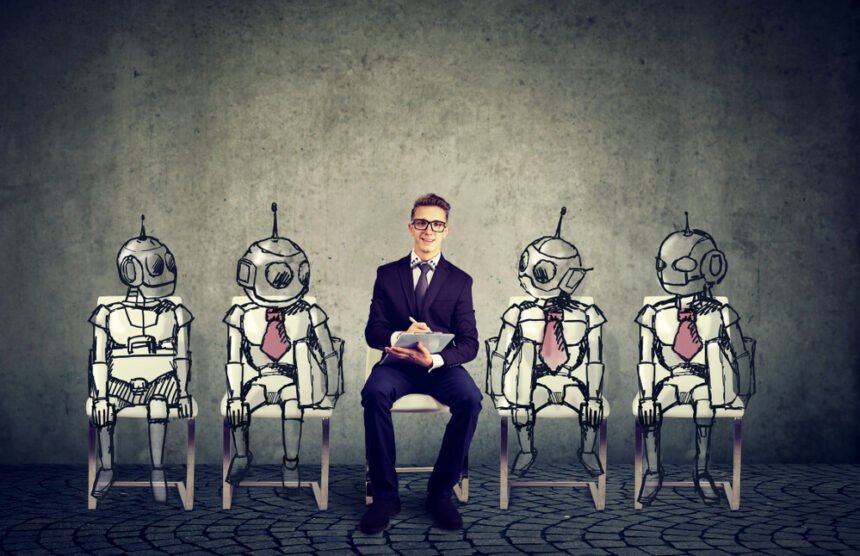The rise of artificial intelligence or AI in the past decades has resulted in collective anxiety worldwide. The common apprehension is that there will be a massive loss of jobs as robots and computers eventually replace employees. The fear is not without some basis; robots and computers have proven to be far better than humans at executing certain tasks. However, it must be noted that not all jobs will eventually be replaced by AI. So, what’s the secret to staying ahead and remaining employable? The answer lies in knowing what AI is capable of doing better than humans and what humans are capable of doing better than AI.
What is the Future of Robotics?
The future of robotics holds immense potential for technological advancement and transformation in various industries. It has changed people’s thinking and opened up different ways to explore topics. With rapid developments in artificial intelligence, machine learning, and sensor technology, robots are becoming increasingly capable of performing complex tasks previously thought to be only achievable by humans.
In the coming years, we can expect robots to play a more prominent role in sectors. Robotic technology is also used in healthcare, manufacturing, agriculture, and logistics. The rise of collaborative robots, or cobots, is already changing how humans and robots work together, as well as tasks requiring more efficiency.
Furthermore, as robotics technology advances, there will be a greater emphasis on developing robots with human-like agility and adaptability, leading to a wide range of applications in both professional and domestic settings. They have forecast on the automation of jobs.
Jobs AI Can Replace
It is no secret that many jobs have been taken over by AI in 2022. For example, many manual tasks human hands perform are now fully automated. You don’t have to sew by hand or do the dishes yourself, or you can pay for assignment help online, thus delegating all your assignments. But while it is true that AI is constantly advancing, the prediction that robots and computers will completely replace humans is, for the most part, exaggerated.
This is because the jobs replaced by advanced technology are usually confined to relatively simple tasks. Take, for example, machine learning. Machine learning is widely used today, but its function is often limited to one task involving one input and output. Suppose a program can tell which photos show a human face and which do not. The program only has one output: to identify which among the inputs are photos of human faces.
Although programs like the one described above have various applications, they have two disadvantages. Firstly, massive amounts of data are necessary for the program to perform the task well. Thus, the sample program will need to learn from many thousands to millions of photos to learn what a human face looks like. Second, developing such programs is resource-intensive, requiring time, labour, and investments for them to be effective enough to perform jobs.
So, how do we know which jobs will more likely be replaced by AI? Some researchers say AI will most likely replace jobs with one output. Also, if a human can execute a mental task in less than one second, it can be automated in the future. Some concrete examples of jobs AI can take over are bookkeeping, proofreading, retail, and telemarketing.
Jobs AI Can’t Replace
So, will AI replace a lot of jobs? Yes. But will it replace all jobs? No, because, fortunately, many jobs go beyond performing one task. In particular, AI cannot easily perform jobs that require soft skills such as empathy and communication, creativity, strategic and critical thinking, and imaginativeness. In the future, possessing these abilities will be a crucial advantage as AI takes over simpler jobs. Let’s take a closer look at these soft skills.
Critical Thinking
One of the soft skills that humans have that AI does not possess is critical thinking. While technology has advanced to the extent that it can perform tasks quickly and precisely, it still needs to employ critical thinking and cognitive skills. AI is often taught to perform tasks in the workplace, but it cannot make decisions when faced with eventualities that go beyond what it has learned. For example, a human can improvise or follow gut instinct, but a machine cannot. Consider, for instance, a nurse or doctor who needs to make sense of separate bits of information to determine the best course of action for a patient in a medical emergency.
Strategic Thinking
Another competency that gives humans an edge over AI is strategic thinking, which is the ability to formulate strategies. Similar to critical thinking, collaborative work, and strategic thinking requires a person to be able to make decisions based on information analysis, and he must be adaptable. It also includes their complex relationships with each other. For example, one program can gather a lot of data about consumer preferences for a product. In contrast, another program can collect the demographic data of buyers. Still, it takes a human with strategic thinking to synthesize the data to develop a marketing plan for the said product.
Creativity
In recent years, AI has advanced enough to produce creative works and help humans physically, such as art, music, and even writing. However, what these works lack is the uniquely human touch. AI can produce creative works only by imitating input, and it does so without understanding and consciousness.
But nothing equals a creative work that’s original, innovative, relatable, and able to capture and express human emotion and the human condition. This is why jobs that require creativity, such as those in writing, music, the visual and performing arts, and even engineering and marketing are less likely to be replaced.
Empathy and Communication Skills
Another advantage humans have is their capacity for empathy and effective communication skills. Humans can relate to and understand each other in ways that machines are unlikely to achieve anytime soon, if at all. This is why jobs that require excellent communication skills and empathy are likely to need to be automated. For example, professionals in healthcare, education, social work, and psychology employ a full range of competencies to converse, interact, and respond to their clients. Such jobs are currently irreplaceable.
Imagination
Much like creativity, imagination is currently unique to humans. As mentioned earlier, AI can only execute tasks learned through input. Meanwhile, more advanced AI can get better at performing more complex tasks. But what AI cannot do right now is to go beyond the parameters of what it has learned.
Humans, by contrast, can use their imagination to dream up new possibilities. Consider a designer who uses a computer program for renditions. The program quickens and streamlines the rendering process, but it cannot make stylistic decisions like the designer. This is why inventors, thought leaders, entrepreneurs, writers, artists, and visionaries are unlikely to be replaced by robots or computers anytime soon.
Psychical Skills
Another ability that gives humans the upper hand is possessing unique physical skills. This may stem from the fact that humans have a great appreciation for exceptional physical skills. After all, there is nothing like watching an accomplished ballerina dancing gracefully across the stage or a star athlete running at record speed. Whether these are fine skills, such as that of a concert pianist, or brute strength, such as that of a weightlifter, extraordinary physical skills will remain an important asset for getting a job in the future.
Technical Know-How
Finally, technical knowledge is an advantage that humans have over AI. Regardless of their abilities, robots and machines still depend on humans for design and upkeep. These technologies need to acquire the ability to maintain themselves so that humans capable of working on them will remain employable.
How can automation integrate with other emerging technologies such as AI, IoT, and cloud computing?
Automation has the potential to integrate seamlessly with other emerging technologies, such as AI, IoT, and cloud computing, creating a powerful ecosystem of interconnected systems. AI can enhance automation by enabling machines to learn and adapt to new situations, while IoT can provide real-time data to inform and improve automated processes.
Cloud computing can support automation by providing scalable and flexible infrastructure, allowing for storing and processing vast amounts of data. By integrating these technologies, businesses can create more efficient and intelligent systems that can automate repetitive tasks, make real-time decisions, and adapt to changing conditions in a way that was not possible before. This integration can potentially revolutionize industries and drive innovation in numerous fields.
Human vs Robot
There are several factors to consider in the ongoing debate of robots vs humans.
Abilities
Robots are often touted for their precision and efficiency in carrying out repetitive tasks, while humans excel in creativity, emotional intelligence, and complex problem-solving.
Adaptability
Human workers can learn and adapt to new situations, whereas robots are limited by their programming and may struggle to navigate unexpected challenges. Robots help in optimization and productivity and also help in quick decision-making. Certainly, robots far outperform humans in terms of efficiency.
Interaction
Meanwhile, robots can be programmed to show empathy and understanding; these human machines lack the genuine connection and emotional depth humans bring to interpersonal relationships. Their future is unpredictable.
Ethics
The use of robots raises ethical concerns around job displacement, privacy, and accountability for their actions.
Collaboration
In many cases, the best results are achieved through collaboration between humans and robots, each contributing their unique strengths.
Ultimately, the human vs robot debate is not about replacing the other but finding ways to leverage the strengths to create a more productive and harmonious society.
Final Thoughts
As computers, robots, and machines take over more and more jobs, finding a job is bound to become increasingly difficult. However, acquiring and developing these soft skills is one of the keys to staying ahead of the game, whether competing against AI or fellow humans.







